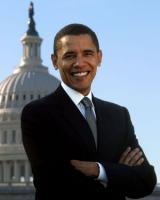Oil industry operatives are sweating bullets over whether the incoming Obama Administration will be keen to buy “dirty oil” from Alberta tar sands. The early news for them is not good.
The president-elect last week sent Jason Grumet, a policy adviser mentioned for a possible energy post, to an environmental conference in Washington to offer reassurances that there would be swift movement on climate change legislation. Observers feel this is an early sign that Obama is taking a hard line on carbon.
“The whole transition team felt it important to be here,” Grumet said. “I think it is going to be a very very busy 2009, and I think we are going to need all of you to be on top of your game.”
Grumet is also no fan of the filthy oil coming from the tar sands. In June, he told reporters, “The amount of energy that you have to use to get that [tar sands] oil out of the ground is such that it actually creates a much greater impact on climate change.”
“We [Obama’s team] are going to support resources… that meet our long-term obligations to reduce greenhouse-gas emissions. And I think it’s an open question as to whether or not the Canadian resources are going to meet those tests,” said Grumet.
You can almost feel posteriors puckering across the oil patch. After all, what good is the world’s largest capital project, if the US doesn’t want to buy what it produces?
So far over $200 billion has been sunk into this bitumen boondoggle. Flagging oil prices, a slowing economy and now a new Administration committed to a green energy future all add up to bad news for big oil.
No surprise then that Canada’s Prime Minister Stephen Harper virtually lunged at the newly elected Obama with a protect-the-oil-sands-plan almost before the victory confetti had hit the ground in Chicago.
According to analyst Gwen Dyer, “Harper’s strategy is transparent. He wants a climate-change pact with the United States in which Alberta’s “dirty oil” is exempted from controls on the grounds that it contributes to that other American national goal, “energy independence.”
Dyer points out that the boogieman of an oil embargo of the kind that traumatized the US in 1973 has long since become a red herring. Why? Because since ’73 oil-exporting nations such as Saudi Arabia have become as addicted to selling the west their oil as we have become at buying it.
Saudi Arabia seen its population triple in the last thirty five years. Even with this massive increase in people, their per capita GDP has also risen by a stunning 556% between 1973 and 2006. Yet as of 2007, non-oil manufacturing contributed a mere 10% to Saudi Arabian GDP and less than 6% of total employment. If America has an oil monkey on its back, so do the Saudis.
Real “energy independence” has much more to do with reducing carbon emissions and avoiding shoveling billions of dollars into someone else’s economy. Canada would of course enjoy the US pouring all that cash into our coffers instead, but that will not help the American trade balance much more than buying Saudi crude.
According to Dyer, “Stephen Harper is appealing to the stupid version of the energy independence policy: Maybe the Ay-rabs won’t sell you their oil, but the Canadians always will. It will be instructive to see if Obama falls for it.”
Subscribe to our newsletter
Stay up to date with DeSmog news and alerts







